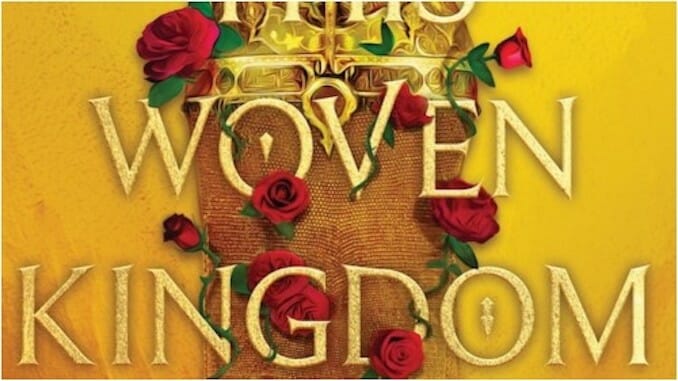This Woven Kingdom: A Star-Crossed Romance Set in a Rich Persian-Inspired Fantasy World

Mythological and fairytale retellings are all the rage these days, with authors avidly mining familiar stories from Greek tragedy and European folklore for the bones they’ll use to create new tales. But while most Western readers are sure to have come across a favorite new version of Little Red Riding Hood, Beauty and the Beast, or even Homer’s The Odyssey, it’s only in recent years that we’ve started to see more books inspired by texts from other cultures or belief systems from places such as the Middle East or Southeast Asia.
And the results have been fairly magical, weaving in elements from long-forgotten histories and marginalized cultures in fascinating and deeply rewarding ways. (Yes, this is where I slip in my plea for everyone to run, not walk and read S.A. Chakraborty’s “Daevabad” trilogy, Tasha Suri’s Empire of Sand duology, and R.F. Kuang’s The Poppy War series.)
This Woven Kingdom is the latest novel in this vein, inspired by the Middle Eastern epic poem the Shahnameh, which tells a romanticized version of the history of the Persian Empire. It’s the first installment in a new trilogy from bestselling author Tahereh Mafi, probably best known for her mega-popular Shatter Me series, and it uses this history to put a refreshing twist on the story of two star-crossed lovers whose feelings for one another could well destroy not just a kingdom, but possibly humanity itself.
The long-ago fall of the Jinn known as Iblees, a being of fire who rebelled against God, has meant that his people have been cast out ever since, forsaken by the universe and forced to watch humanity (known as “Clay”) inherit the world that was once theirs. After centuries of exile and bloody war, the kingdom of Ardunia’s Fire Accords ended the fighting and established something like peace between the races. Though this tenuous cease-fire put a stop to the overt bloodshed between Clay and Jinn, the Jinn are largely forced to exist as second-class citizens in its aftermath, whose preternatural abilities are often exploited and where any use of their powers carries an automatic sentence of death.
This Woven Kingdom follows the story of Alizeh, a Jinn working as a lowly servant in a noble house who struggles with the basics of survival even as she lives under the threat of constant persecution. The mystical ice that runs through her veins is not just uncomfortable but marks her as the heir to a long-lost kingdom whose power is prophesied to one day lead to the fall of the King of Ardunia himself. But Alizah, who lives a life of grinding poverty and experiences frequent abuse at the hands of those who see themselves as her betters, dreams not of a crown, but of a quiet life in isolation, one in which she can finally stop running from threats both real and imagined.
-

-

-

-

-

-

-

-

-

-

-

-

-

-

-

-

-

-

-

-

-

-

-

-

-

-

-

-

-

-

-

-

-

-

-

-

-

-

-

-








































